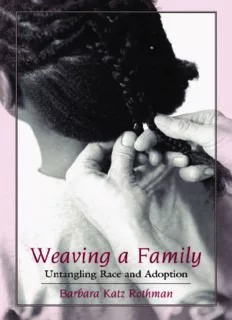
Weaving a Family: Untangling Race and Adoption PDF
Preview Weaving a Family: Untangling Race and Adoption
Weaving a Family e Weaving a Family Untangling Race and Adoption Barbara Katz Rothman Beacon Press Boston Beacon Press books are published under the auspices of the Unitarian Universalist Association ofCongregations. © 2005 by Barbara Katz Rothman All rights reserved Printed in the United States ofAmerica 09 08 07 06 8 7 6 5 4 3 2 1 This book is printed on acid-free paper that meets the uncoated paper ansi/nisospecifications for permanence as revised in 1992. Text design by Patricia Duque Campos Composition by Wilsted & Taylor Publishing Services Libraryof Congress Cataloging-in-Publication Data Rothman, Barbara Katz. Weaving a family : untangling race and adoption / Barbara Katz Rothman. p. cm. Includes bibliographical references and index. isbn0-8070-2830-4 (pbk. : acid-free paper) 1. Interracial adoption—United States. 2. Interracial adoption—United States—Case studies. I. Title. hv875.64.r68 2005 362.734´089´00973—dc22 2004021448 To Cassie, Alexandra, Victoria, Samantha, and Kaylee, with love And in loving memory of Carl Colb Contents Preface A Word on Theory, Method, Language (and Source Notes) ix Part I Personal Strands 3 1. Family, Obviously 9 2. Our Story Part II Motherhood, Adoption, and Race 27 3. Unraveling the Pieces 30 4. Motherhood in the Marketplace 54 5. Adoption in the Age of Genetics 76 6. Talking About Race Part III What I Learned at the Schomburg 95 7. Images 103 8. Children of a Diaspora 111 9. Protégés 120 10. The Pet 134 11. The Trophy Child 12. 142 Imagine Part IV Weaving the Pieces 147 13. Home from the Schomburg 153 14. Going Places 162 15. Culture: Celebrating Diversity 174 16. Identity: Pride and Joy 189 17. Entitlement: That Can’t Be Your Baby 18. Hair: Braiding Together Culture, 206 Identity, and Entitlement 225 19. Weaving a Way Home 235 Notes 264 Acknowledgments 266 Index Preface A Word on Theory, Method, Language (and Source Notes)1 This book is written in the vernacular. It relies heavily on spo- ken English. For a sociologist writing in the early part of the twenty-first century, this is an unusual choice oflanguage. “You write well,” my colleagues tell me, as my professors used to—and it’s not always a compliment. Ifthings are too easy to read, they don’t always sound serious. Diƒerent languages are suited to diƒerent tasks. Academic language obscures feelings and heightens (if obfuscates) intel- lectual content. The vernacular obscures the theoretical and in- tellectual substrate and displays emotive content. It would be a mistake to read academic language and think it is devoid of values, feelings, or experience. It is no less a mis- take to read the vernacular and think it is devoid of theory and research. The language I’ve chosen is ordinary, everyday English, and that language is a rich and nuanced one. My word choices are deliberate, reflecting my values and politics. I’m writing about raising children, and about race. We have so many words to use ix
Description: